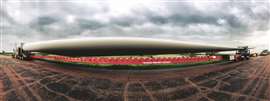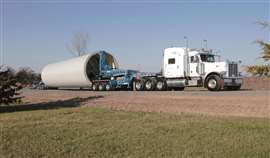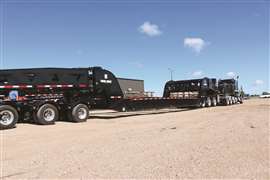From welder to VP: Ty Hanten’s 37-year journey at Trail King
26 November 2024
Trail King is a revered brand known for its longevity, commitment to quality and innovation. Founded in 1974 by Gordon and Shirley Thomsen, the company started out as Western Ag Sales, a distributor of agricultural equipment.
 Ty Hanten, Vice President, Sales and Marketing, Trail King
Ty Hanten, Vice President, Sales and Marketing, Trail King
Four years later they purchased Plains Industries and began producing the Trail King brand of trailers. These trailers were built with an industry leading feature – the detachable gooseneck – which allowed for quick, one-person connection and detachment. In time, the company would narrow its focus to trailer manufacturing operations, producing trailers for many different industry sectors including agriculture, energy, construction, material hauling and specialized transportation.
Through its 50 years of business, Trail King has grown exponentially, expanding its product line and providing a variety of hauling solutions. Today, Trail King is North America’s leading trailer manufacturer by a number of measures.
Trail King is also known as a great place to work, whether you are a welder or an executive. Sales and Marketing Vice President Ty Hanten has experienced both, and after 37 years with Trail King, he is grateful for every step of the way. He was promoted to vice president of sales and marketing in 2022, replacing Rick Farris, who retired from that role after 37 years with the company.
“I began my journey at Trail King as a welder, shaping my skills through various roles in production, customer service and quality,” he said.
Working his way up
Hanten began his career just after high school as a night welder at the company’s Mitchell, South Dakota manufacturing plant. After attending North Dakota State College of Science, he started working his way through the management ranks of the company.
Prior to taking on his current role, Hanten served as director of customer service. He also assisted with the transition when Trail King acquired companies Ti-Brook and Red River, relocating both times to help manage the process. Hanten made his mark by leading the charge to improve the customer experience. Other jobs he performed include overseeing operations, quality, customer service and delivery.
 Trail King’s TKEFX is used for hauling wind tower blades.
Trail King’s TKEFX is used for hauling wind tower blades.
Hanten is a well-known and respected player in the specialized and heavy haul market. He’s always in a good mood and engages everyone with a pleasant nature and a handshake.
Insightful and a seasoned industry professional, Hanten reflected on his personal growth within the company, the evolving market demands Trail King has met over five decades and how a culture of innovation and quality continue to drive the brand forward.
How do you characterize the market for heavy haul trailers?
The heavy haul trailer market is thriving. With consistent demand and steady activity, it’s an exciting time for industry players.
What are the biggest challenges for Trail King today?
At Trail King, the key to our success lies in our people. Today, we’re facing a significant challenge in the marketplace: sourcing skilled talent who can help us build the best trailers in the world for our customers’ success.
Workforce development is a hot button issue in our industry. How does Trail King attract, train and retain workers?
Attracting and retaining top talent starts with a competitive employment package. We believe in customizing training programs that empower our employees to master the skills needed for success in production. Together, we build a stronger workforce.
 Trail King’s 13-axle hydraulic Schnable system is often used for hauling the tower sections of wind towers.
Trail King’s 13-axle hydraulic Schnable system is often used for hauling the tower sections of wind towers.
For a time after the pandemic, supply chain issues affected almost every manufacturer in our industry. Do you still see supply chain problems?
There are some, but for the most part, supply chain suppliers have returned to pre-pandemic levels.
What are the leading industries for heavy haul trailer usage in North America?
Heavy haul trailers play a vital role in our industries. From wind energy to port shipments, and the backbone of our electrical infrastructure – transformers and oil/gas – our trailers are essential for transporting heavy equipment.
Trail King is one of the most recognized brands in the heavy haul market, and the company has decades-old trailers still out working. What is the typical lifespan of a Trail King trailer?
Our trailers are built to last, and in the heavy haul market we see trailers that are 20 to 30 years old.
Do you ever remanufacture older trailers?
Our dedicated refurbishment department specializes in reviving trailers, offering top-notch craftsmanship and personalized service. Whether it’s repairs, upgrades or a complete makeover, we’ve got you covered.
How do you characterize the market for trailers designed specifically for the wind power sector?
The wind power sector is a whirlwind of opportunity – but it’s not without its challenges. The market for specialized trailers has become increasingly volatile, heavily influenced by government subsidies. As policy shifts, so does the landscape for innovation and sustainability in this vital industry.
 Trail King’s perimeter frame, which expands from 12 to 20 feet wide, is widely used in E-building infrastructure work and for other specialized hauls.
Trail King’s perimeter frame, which expands from 12 to 20 feet wide, is widely used in E-building infrastructure work and for other specialized hauls.
What keeps you engaged in your job and this industry?
My passion for this industry drives me daily. The ever-evolving landscape and the dynamic needs of our customers keep me engaged and inspired. Every challenge is an opportunity to innovate, adapt and grow alongside those we serve.
What is your business philosophy?
Provide the best product and service in the industry.
What do you spend time doing when you are not working?
I enjoy spending time with my family, racing sprint cars, hunting, fishing and generally anything that involves being outside.



